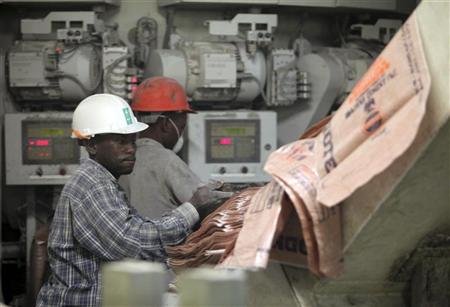Determined to give Nigerian construction sector value for money and to maintain industry lead in cement manufacturing in Africa, Dangote Cement has finalised plans to raise its cement grade from the popular 42.5 to 52.5 grade.
Dangote Cement at the press briefing recently stated that all the products rolling out of its three cement plants are certified 42.5 cement grade in line with international standard and quality benchmark but noted that it was nursing the idea of including 52.5 grade in its product lists.
The Chief Executive Officer, Mr. D.V.G. Edwin, had earlier told the press that Dangote Cement’s adherence to global best practices informed the production of 42.5 cement grade in all its factories.
Addressing a cross-section of the media in Lagos, he said that Dangote Cement chose to produce 42.5 cement grade as it is stronger and has better qualities. According to him, the cement grade possesses higher strength capability and is rapid setting making it the preferred grade among blockmakers, builders and construction workers.
Explaining why Dangote Cement is laying emphasis on the production of 42.5 grade cement, Edwin said that prior to the nation attaining self-sufficiency in cement production, the Standards Organisation of Nigeria (SON) stipulated the 42.5 grade as the grade accepted to be imported into the country and all importers complied.
Dangote Cement, as a responsible market leader, has continued to produce 42.5 grade in its three plants in strict adherence to the stipulations of SON. He wondered why SON should insist on 42.5 grade as the standard for import and then allow a lower grade in terms of local production.
“How come during the import era, we were all compelled by the regulatory authorities to bring in 42.5 grades and now since 2012 when import was banned, the same regulatory authorities condoned the production of 32.5 grades.”
Reacting to claims by a cross section of cement manufacturers that the root cause of building collapse is not cement quality but poor use of materials especially 32.5 grade by builders, Edwin advocated that the best way to ensure safety in the construction industry is to insist on 42.5 as the grade to be produced and used in Nigeria. He explained that despite seminars and trainings to educate builders on how to use 32.5 grade in building, the unscrupulous ones among them still cut corners to cheat on quality, insisting that, “incidence of building collapse will be greatly reduced if we adhere to a common quality specification leaving no opportunity for manipulations.”
He debunked claims by some cement manufacturers that switching over to 42.5 grades would impact negatively on their profit margins, adding that producing the grade will lead to a marginal cost increase, which should be seen as a patriotic gesture to stem the tide of building collapse.
“We place a high premium on human lives and not cost. Nothing on earth can be substituted for human lives. Those arguing that migrating from 32.5 to 42.5 will erode their profit margin are insincere and selfish as human lives are more important than profit taking,” he said.
As part of promoting best practices in the building industry, Edwin said that Dangote Cement in the past two years has held several trainings and demonstrations with block makers across the nation to educate them on how to achieve premium results using the 42.5 cement grade.
This has become a permanent feature in our operations.
Giving a breakdown of the different grades of cement available, he noted that 92 per cent of Portland cement produced in the United States (US), are in 52.5 and 42.5 Grades, while other imported cement from China, Japan, Denmark and Paris are all 42.5 Grade.
He said, “Over 90 per cent of consumers are not aware of the different types of cement available in Nigeria. Their expectations in respect to the performance of cement are the same regardless of the type. The grade (quality) of concrete to be used may allow 32.5 grade cement for certain construction work such as pavements, rendering (plastering) and culverts but would demand 42.5 grade cement for structures, columns, bridges and multi storeyed buildings.”
A coalition of civil society groups and professional bodies in the construction industry are set to launch a major campaign for the standardization of the manufacturing and importation of the product. The coalitions, according to media reports, have called on the relevant authorities to initiate actions to make 42.5 grade of cement the standard product in Nigeria.
The stakeholders’ argument is that nearly all the cement manufacturers and importers in the country are in the habit of taking advantage of the lax regulation and lack of enforcement to vary their pigmentation in favour of the lower grade cement (32.5) which in most cases is used in building and seen to be partly responsible for the collapse of houses. They believe that the Standards Organisation of Nigeria (SON usually overlooks the practice, which is quite prevalent.


